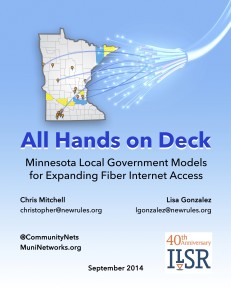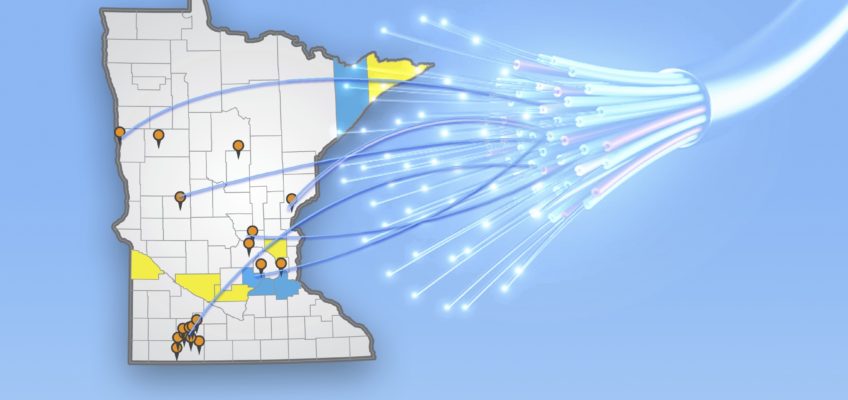Minneapolis, MN —In 2010 the Minnesota legislature set a goal: universal access to high speed broadband throughout the state by 2015. As 2015 approaches we know that large parts of Greater Minnesota will not achieve that goal, even as technological advances make the original benchmarks increasingly obsolete.
But some Minnesota communities are significantly exceeding those goals. Why? The activism of local governments.
A new report by ILSR, widely recognized as one of the most knowledgeable organizations on municipal broadband networks, details the many ways Minnesota’s local governments have stepped up. “All Hands On Deck: Minnesota Local Government Models for Expanding Fiber Internet Access” includes case studies of 12 Minnesota cities and counties striving to bring their citizens 21st century telecommunications.
“When national cable and telephone companies have refused to modernize their communications systems, local governments have stepped up. And in the process saved money, attracted new businesses, and made it more likely that their youth will stick around,” says Chris Mitchell, Director of the Institute for Local Self-Reliance’s (ILSR) Community Broadband Networks Initiative.
- Windom, which is one of the most advanced networks in the state, built their own network after their telephone company refused to invest in their community.
- Dakota County showed how a coordinated excavation policy can reduce by more than 90 percent the cost of installing fiber.
- Lac qui Parle County partnered with a telephone cooperative to bring high speed broadband to its most sparsely population communities.
ILSR’s report is particularly timely because this week, the governor’s office began accepting applications for the state’s new $20 million initiative Border-to-Border program. “We hope that before communities submit their applications they read this report to learn what others have done,” says Mitchell.
 Click here to read and download the full report.
Click here to read and download the full report.
The Institute for Local Self-Reliance presents this in-depth case study co-authored by Lisa Gonzalez and Christopher Mitchell.
Read ongoing stories about these networks at ILSR’s site devoted to Community Broadband Networks. You can also subscribe to a once-per-week email with stories about community broadband networks.
ABOUT Community Broadband Networks (http://www.muninetworks.org):
At MuniNetworks.org, we provide resources for those joining the movement to build broadband networks that are directly accountable to the communities they serve.
As more community leaders realize the economic benefits of faster, more reliable Internet services, they are pursuing local control of connectivity through public ownership, cooperative models, and other nonprofit approaches.
The vast majority of community broadband networks, particularly fiber-to-the-home networks, have lowered prices and spurred job growth in their communities. We find out what works, and help other communities replicate these results. MuniNetworks.org is a trusted voice for community networks, our team advises high-ranking broadband decision-makers, and speaks on radio and television programs in markets across the United States.
ABOUT ILSR (http://www.ilsr.org):
We believe we make better and more informed policies when those who design those policies are those who feel their impact.
ILSR works with citizens, activists, policymakers and entrepreneurs to provide them with innovative strategies and working models that support environmentally sound and equitable economic policies and community development. Since 1974, ILSR has championed local self-reliance, a strategy that underscores the need for humanly scaled institutions and economies and the widest possible distribution of ownership.





